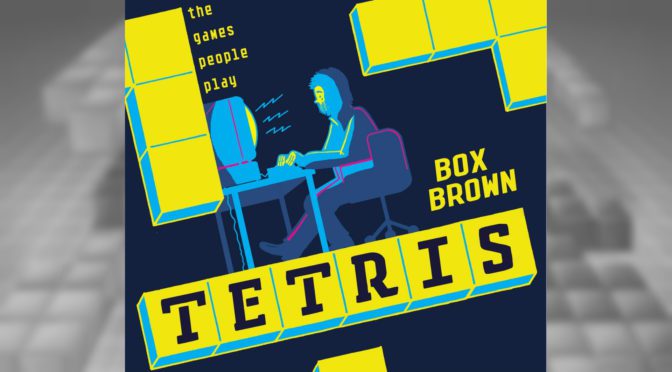Tetris: The Games People Play by Box Brown is a fantastic documentary on the complicated history of how Tetris came to be, and how it came to be marketed around the world. It’s an engaging story that shows how the early video game industry was essentially the wild west, especially with regards to Russia. But what really makes this re-telling of the Tetris story special is the graphic novel format of the book.
 I pretty much know Tetris inside and out, so the story wasn’t all that new (video games are my job after all), but the manner in which it was presented was refreshing. Box Brown is an award-winning cartoonist and illustrator best know for his book Andre The Giant: Life and Legend. His unique art style is simple (choosing to work in only yellow and black), yet effective, especially when it comes to storytelling. Brown has a good understanding of pacing and allows his art to bend, stretch, and flow as the panel and dialogue deems it fit. This isn’t hyper-realistic art, instead falling into the cartoon genre, but this works to the books advantage.
I pretty much know Tetris inside and out, so the story wasn’t all that new (video games are my job after all), but the manner in which it was presented was refreshing. Box Brown is an award-winning cartoonist and illustrator best know for his book Andre The Giant: Life and Legend. His unique art style is simple (choosing to work in only yellow and black), yet effective, especially when it comes to storytelling. Brown has a good understanding of pacing and allows his art to bend, stretch, and flow as the panel and dialogue deems it fit. This isn’t hyper-realistic art, instead falling into the cartoon genre, but this works to the books advantage.
Coming in at 256 pages Tetris: The Games People Play is a meaty read in terms of a graphic novel, which is great, as this isn’t the sort of book you are probably going to breeze through in a single sitting. Major timeline shifts in the history of Tetris are broken up well and there are clear endings to major plot points. The comic format keeps you really invested in everything going on and makes the book not feel like a standard documentary.
 What I really appreciated was in the depiction of Alexey Pajitnov throughout the book. The creator of Tetris is an interesting man that was caught up having created a game that took over the world. Neither Pajitnov nor his country knew how to handle things and this makes for an interesting story. We have the read facts surrounding the story before, but seeing a character drawn and shown with real emotions gives us a new look at what happened.
What I really appreciated was in the depiction of Alexey Pajitnov throughout the book. The creator of Tetris is an interesting man that was caught up having created a game that took over the world. Neither Pajitnov nor his country knew how to handle things and this makes for an interesting story. We have the read facts surrounding the story before, but seeing a character drawn and shown with real emotions gives us a new look at what happened.
But the book is more than simply Tetris, and this may or may not be an issue with some. For me, the brief intro into gaming;s history and its place as a sort of cultural event was a nice build as time caught up with Tetris. Brown also spends a lot of time going into the issues with Nintendo and their industry issues with others. It’s all really nice to see, but I can’t help but think some of it was simply padding, as Tetris doesn’t play a huge part in it. It leaves me feeling like Brown really wants to do a book based simply on Nintendo and that simply bled through into this Tetris story.
That said Tetris: The Games People Play is a fantastic book with some really lovely art. Odds are even video game veterans are going to learn something new (I did), but if you only know Tetris from one of the thousands of versions over the years, this book makes for a darn compelling read.
4/5
‘Great’

